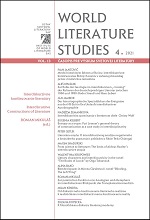From science to literature: The limits of Aldous Huxley’s interdiscursive utopia
From science to literature: The limits of Aldous Huxley’s interdiscursive utopia
Author(s): Maxim ShadurskiSubject(s): Studies of Literature, History of ideas, Recent History (1900 till today), Theory of Literature
Published by: SAV - Slovenská akadémia vied - Ústav svetovej literatúry
Keywords: Literature; Science; Interdiscursivity; Utopia; Aldous Huxley; “Brave New World";
Summary/Abstract: Throughout much of his writing career, Aldous Huxley contributed to the interdiscursive construction of literature as a utopia, a common ground between scientific and literary discourses. This article explores both the explications and limits of Huxley’s interdiscursive utopia, focusing primarily but not exclusively on his most famous and highly ambiguous novel Brave New World (1932). Read against the background of pertinent criticism and contextualized in 1920s and 1930s debates about the changing prominence of science and the scientist in Britain, Huxley’s enterprise manifests a considerable preserve of social prejudice and hierarchical thinking. This circumstance detracts substantially from the interdiscursivity of his utopia and compromises literature’s claim to a holistic representation of social reality.
Journal: World Literature Studies
- Issue Year: 13/2021
- Issue No: 4
- Page Range: 83-93
- Page Count: 11
- Language: English

